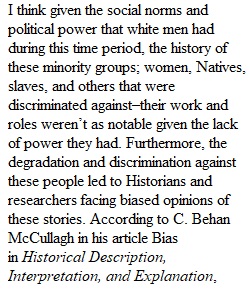


Q This week we read about the Enlightenment and Great Awakening religious movements that captured the 18th century colonists of America. As the text points out, those who participated in these movements were mainly white, male, and Protestant. In most survey courses of the U.S. we discuss these movements as they were important in shaping our country but they also leave out a great deal of other people who existed in the colonies at the time. I would like you to take a few minutes to give your opinion on the following questions. Why do you think on the whole, historians have not brought in the stories of the women, minorities, Native Americans and enslaved peoples? What obstacles do you think historians face in trying to tell these stories? Finally, I would like you to briefly research (you should not spend more than 20 minutes on this) the early 18th century colonies and see if you can share a primary source (meaning from the time) about one of these groups of people that were not represented. It can be a picture/painting or a text. If you are successful, please share the source you found and explain how you found it. If you are not successful, please explain why and what obstacles you found in researching. I look forward to seeing what you find and learning some more about the early 18th century in colonial America.
View Related Questions